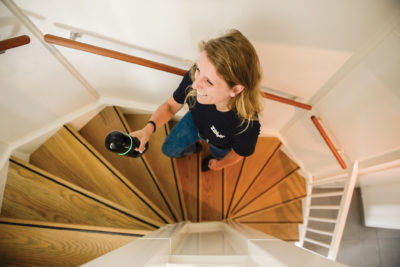
Zibber personnel enjoy using the handheld Leica BLK2GO. This illustration shows that the instrument’s capabilities extend to multi-story dwellings.
Lidar is now being used to address an age-old problem that impacts nearly everybody—real-estate valuations. As accuracy improves and form factors get smaller, there’s a growing opportunity to apply lidar-based handheld scanners to capture, document, and measure properties. At first, this may not sound like a big issue. However, when you realize a home is one of the most significant purchases a person makes, accurate valuations are critical. Yet many properties are listed with the wrong dimensions. This impacts valuation, insurance, and taxes, to name just a few of the associated issues. With this in mind, let’s take a closer look at how lidar is currently being used for housing valuations.
Accurate measurements to meet real-estate industry regulations
Zibber, a Netherlands-based real-estate documentation and visualization firm, is dedicated to helping real-estate agents, potential home buyers, and other stakeholders in the measurement, design, and transaction process adhere to local standards to ensure homes are properly valued. The firm provides accurate floorplans to real-estate agents to make sure that homes are measured as precisely as possible. While Zibber is based in Europe, the fundamental issues of accurate property valuations are global.
One of Zibber’s main missions is to calculate the correct square and cubic meters to meet industry-wide measurement regulations. This process is of utmost importance to real-estate agents because, in the Netherlands, there’s a high standard for real-estate measurement. This standard is defined in branchebrede meetinstructie (industry-wide measurement instruction), or BBMI1, a Dutch regulation for “the exchange of uniformly structured information in this field.” For example, if a house is sold at too high a valuation based on inaccurate measurements, the real-estate agent can be held legally responsible.
Zibber’s approach relies on a handheld laser scanner. Using the Leica BLK2GO from Leica Geosystems, part of Hexagon, Zibber surveyors scan a home and the entire design, look and feel of the living space. Additionally, they provide immersive visualizations that are derived from high-resolution photography and data from the scanner. By calculating accurate dimensions and quickly providing high-end photography, Zibber helps realtors successfully market each home. Additionally, the process helps potential owners envision living in a space while enabling both agents and buyers to arrive at accurate valuations and fair transactions.
“We distinguish ourselves from our competition by acting as an extension of the real-estate agency,” said Hans Meeuwsen, chief innovation officer and co-owner at Zibber. “This allows us to relieve the real-estate agent of work and bring homes to the market faster by processing all media, fully automated, after the appointment and deliver everything to the broker within one working day. These automations in combination with the scanner give us a big advantage over the rest of the market.”
How Zibber rises above the competition
The scanner is making an impact for businesses like Zibber due to its ease of use, speed, precision, and ability to produce highly valuable deliverables. “When we started to look for a solution, we saw other companies, but none of them seemed to have such a longstanding commitment to creating the best technology,” said Dogan Kahveci, CEO and co-owner at Zibber.
The scanner fits in a briefcase, making it easy for the Zibber team to bring to a house. It also easily integrates into the company’s existing workflow. Since it’s easy to use, company workers are quickly up and running with the technology.
Zibber currently operates the largest fleet of scanners in the Dutch market, and Dogan and his team were able to train their photographers, who capture and measure properties, to use the scanner so that they only need one person to do the job with the scanner and a camera. This, according, to Zibber, adds a “cool factor” to the process.
“If there are other people at the house, they always think the scanner is a cool device that looks great, and they ask about what it does,” Dogan said. “So, we explain how it measures everything accurately by simply walking and holding it, and they’re always surprised and amazed. Using the phone alongside the scanner also shows people how it works, and they’re flabbergasted with what it does when they see the live visual feedback on the phone.”
How scanner technology is changing the real-estate industry
Zibber’s process is simple. They turn the scanner on, load the app, and walk through the house. “It’s amazing to see the real-time map of the house pop up as you walk,” Dogan said. “Then you set it on a table to transfer data to a laptop, and, in the meantime, we take photos of the house.”
Once the scanner captures a home, Zibber’s team transfers the data into a fully automated data stream from their cloud servers that process the scanner data—Zibber’s own creation, their backbone to process all point clouds—and deliver it straight to their production house in Vietnam immediately after the scan is completed.
The production house then takes the data, creates an attractive, clean floorplan with exact measurements, and sends it back to Zibber. This process enables Zibber to deliver the floorplan and photos to their clients with a one-day turnaround, and sometimes on the very same day.
The scanner rapidly advances Zibber’s workflow with speed and accuracy to provide a superior deliverable compared to their competition. And the BLK2GO also makes sure Zibber’s measurements and floorplans meet important industry regulations.
Zibber is taking advantage of highly agile mobile mapping tools and applying them to real estate. As real estate, especially in the U.S., remains a hot market, the opportunities for using lidar-based handheld devices to differentiate and ensure proper valuations are abundant.